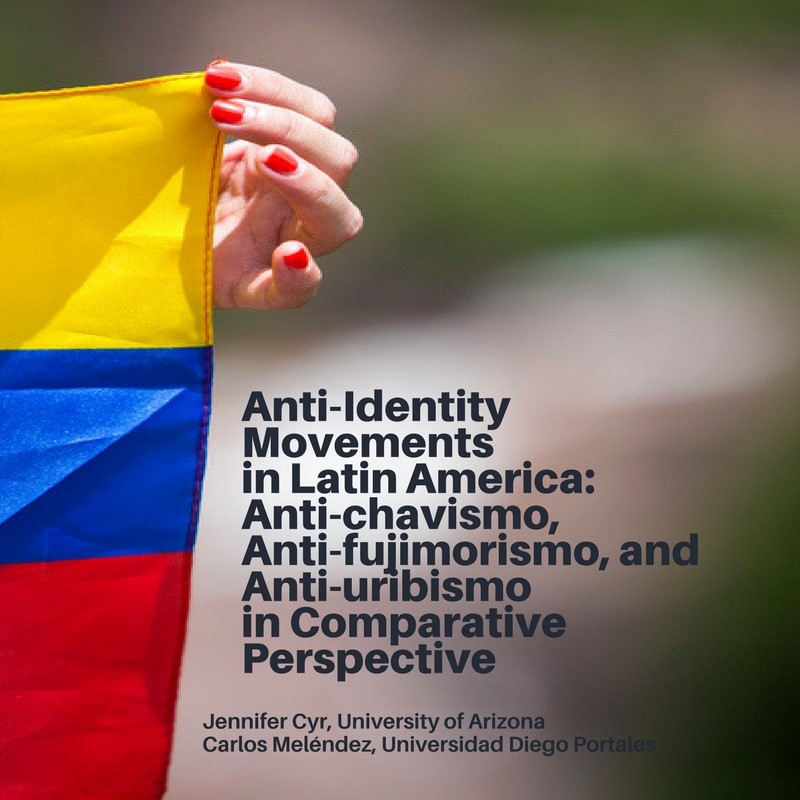The following is part of a series of posts written by MPSA award recipients highlighting outstanding research presented at previous MPSA annual conferences and in the American Journal of Political Science.
 As many individuals who study partisanship know, politics is about identity. People vote for “their” party and support “their” candidates. In some cases, parties and personalities successfully capture the hearts and minds of individuals. These parties forge a strong sense of partisanship with their supporters. Typically, where this kind of partisanship exists, we see positive feedback effects on the political system. Research has shown that strong party identifiers are more likely to participate in politics. They tend to vote regularly, join political organizations, and participate in protest. Moreover, in certain contexts, partisanship correlates with regime support. It is also an indicator of democratic quality: where citizens exhibit stable preferences over time, parties can more effectively channel their demands.
As many individuals who study partisanship know, politics is about identity. People vote for “their” party and support “their” candidates. In some cases, parties and personalities successfully capture the hearts and minds of individuals. These parties forge a strong sense of partisanship with their supporters. Typically, where this kind of partisanship exists, we see positive feedback effects on the political system. Research has shown that strong party identifiers are more likely to participate in politics. They tend to vote regularly, join political organizations, and participate in protest. Moreover, in certain contexts, partisanship correlates with regime support. It is also an indicator of democratic quality: where citizens exhibit stable preferences over time, parties can more effectively channel their demands.
The potentially positive effects of partisanship are, therefore, multiple. It should come as no surprise, given these widely accepted findings, that a marked decrease in levels of party identification will have negative consequences for a party system and also for a democratic regime. Where partisanship is weak, electoral volatility grows, accountability suffers, and the quality of representative institutions decreases. In the most extreme cases, a loss of partisan identification can provoke the collapse of the party system. When this occurs, voters simultaneously decide to vote every established party out of office. One set of parties is replaced by another, ostensibly overnight. This kind of catastrophic party-system crisis has occurred in several countries, including Bolivia, Italy, Peru, and Venezuela.
Our research seeks to understand what happens to representation in countries that experience major party-system crisis. Party-system collapse represents one kind of party-system crisis. Major crisis also occurs, however, when one or more established parties experiences a sudden decline in votes. In these situations, the electoral supply dramatically changes from one election to the next. Where party systems undergo this kind of rapid and major change, disaffection predominates. Confidence in political parties plummets, and independent candidacies flourish. The political landscape becomes hostile to parties. Under these circumstances, scholars predict that partisanship will be fleeting, if it exists at all.
In our paper, which received the Kellogg/Notre Dame Award for the Best Paper in Comparative Politics, we add nuance to these conclusions. We show that, in post-crisis political systems, marked as they are by instability and high fluidity, anti-identity movements can nonetheless guide the preferences of citizens who hold weak or no partisan sympathies. Anti-identity movements are strong, identity-based predispositions against a particular party or movement. Their adherents are ideologically cohesive in nature. They exhibit certain behavioral tendencies, including a propensity to vote a certain way. In short, we argue that, in unstable political contexts, anti-identity movements can function like conventional partisan identities for their adherents.
To demonstrate the cogency of this argument, we examine anti-identity movements in a region that has undergone serious party-system crisis: the Andean region of Latin America. Specifically, in Peru, Venezuela, and Colombia, parties that dominated politics for years and even decades were rejected by voters, opening up the political system to new “outsider” candidates. These controversial individuals—Alberto Fujimori in Peru, Hugo Chávez in Venezuela, and Alvaro Uribe in Colombia—relied heavily on charisma to govern. They cultivated groups of followers to shore up support for their radical projects. To date, their movements, called fujimorismo, chavismo, and uribismo respectively, have largely transcended formal party organizations—although all three leaders eventually founded a political party to underpin each movement.
The existence of fujimorismo, chavismo, and uribismo has had a profound impact on politics in Peru, Venezuela, and Colombia, respectively. Yet, perhaps even more importantly, even larger groups of individuals who would never support fujimorista, chavista, or uribista candidates have also emerged. In our paper, we focus on these movements. We show that anti-fujimorismo in Peru, anti-chavismo in Venezuela, and anti-uribismo in Colombia are sustained by meaningful, identity-based ties. Each movement attracts adherents who claim they will never vote for a fujimorista, chavista, or uribista candidate. The adherents are consistent in their ideological predispositions, and they vote in ways that are consistent with their beliefs. Overall, we find that anti-identifiers behave in ways that are consistent with positive, partisan identifiers.
This study is the first of a longer project that seeks to better understand the new “-isms” that have emerged in Latin America in the last decades. It represents one of the first comparative applications of social identity theory to political identities in Latin America. As such, it adds to the literature on social identities. It also provides novel insight into political representation and identity in the region.
Indeed, our findings have serious implications for how we understand democratic representation in less stable political systems. We consider the existence of anti-identity political movements after acute party-system crisis—a hallmark of low quality representative institutions. These movements operate in party systems that tend to be dominated by small, ephemeral, or highly regionalized parties with weak roots in society. Yet, our work suggests that a democracy without meaningful party-based representation is not necessarily a democracy without representation. Where identity- and anti-identity-based movements operate, channels exist through which citizens can express at least some of their preferences.
This study also adds to the burgeoning research agenda on negative partisanship. This work has by and large been limited to the study of better institutionalized and more stable party systems. In countries with established two-party systems, for example, we know that an existing anti-identity can have an independent effect on determining vote choices. We also know that positive party identification and ideology drive those negative party evaluations. Individuals vote against one party because of their sense of belonging to another.
Our findings, again, add nuance to this discussion. We show that, in more fluid, multi-party systems, negative partisanship may not be rooted in a coherent positive counterpart. In each of the countries we investigate, a large group of individuals actively oppose Fujimori, Chávez, or Uribe. Despite this strong, consistent tendency to never vote for certain candidates, no single party or leader has emerged in any of the countries to capitalize on the group’s antipathy. We therefore conclude that, in less stable party systems, coherent anti-identities can exist without an equally coherent, positive identity to anchor the negative evaluation. When controversial leaders divide societies, individuals may very easily know whom they are against before they can collectively articulate who they are for. Our work therefore helps us understand how negative partisanship can operate in less stable, more fluid democratic settings.
As mentioned above, the findings here represent just the tip of the proverbial iceberg when it comes to understanding groups similar to anti-chavistas, anti-fujimoristas, and anti-uribistas in Latin America and elsewhere. Our future work, which will include speaking with movement identifiers as well as additional, over-time quantitative data, should add to our initial findings and broaden our understanding of party-less but nevertheless politically cohesive political movements in Latin America and beyond.
 About the Authors: Jennifer Cyr is an assistant professor in the School of Government and Policy and the Center for Latin American Studies at the University of Arizona and Carlos Meléndez is a Postdoctoral Researcher at Universidad Diego Portales. Their research “Anti-Identities in Latin America: Chavismo, Fujimorismo, and Uribismo in Comparative Perspective” was awarded the Kellogg/Notre Dame Award for the best paper in comparative politics presented at the 2016 MPSA conference.
About the Authors: Jennifer Cyr is an assistant professor in the School of Government and Policy and the Center for Latin American Studies at the University of Arizona and Carlos Meléndez is a Postdoctoral Researcher at Universidad Diego Portales. Their research “Anti-Identities in Latin America: Chavismo, Fujimorismo, and Uribismo in Comparative Perspective” was awarded the Kellogg/Notre Dame Award for the best paper in comparative politics presented at the 2016 MPSA conference.
